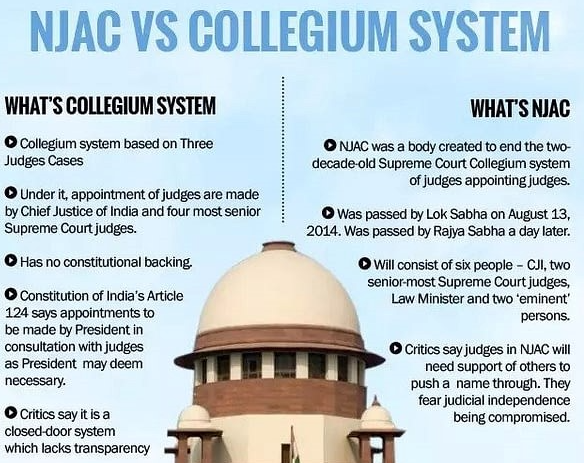Ahmedabad
(Head Office)Address : 506, 3rd EYE THREE (III), Opp. Induben Khakhrawala, Girish Cold Drink Cross Road, CG Road, Navrangpura, Ahmedabad, 380009.
Mobile : 8469231587 / 9586028957
Telephone : 079-40098991
E-mail: dics.upsc@gmail.com

Collegium System
News: The Indian government’s appointment of Justice Siddharth Mridul as Chief Justice of the Manipur High Court is a positive development, showing greater willingness by the government to respect the Supreme Court Collegium’s recommendations.
What are issues between the Center and SC concerning Collegium?
• The Supreme Court has expressed concerns that the Indian government has been selectively approving the recommendations of the Collegium.
• The government has sometimes delayed or ignored the Collegium’s decisions, creating conflicts between the two. Example, Appointment of Justice Murlidhar as CJ of Madras HC.
What needs to be done?
• Streamline the appointment process as prescribed by Supreme court 2021 order which had given clear timelines for government to follow.
• Once a recommendation is reiterated by the Collegium, it should be implemented within three to four weeks.
What is the Collegium system?
• Collegium system refers to the process where a committee involving Chief Justice of India and 4 senior judges of SC and 3 members of High court (where appointment is for HC) appoint and transfer judges in the Supreme court and High Court.
• The Collegium System has not been mentioned in the Constitution. It has evolved through series of Judgments of the Supreme Court (known as 3 Judge cases)
| 1st judge case 1981 (SP Gupta case) – The SC said that executive can refuse appointments for cogent reasons. “Consultation doesn’t mean concurrence” 2nd Judges Case 1993 – A shift from previous stance and the SC ruled that CJI should consult 2 senior most judges from SC in matters of appointment. 3rd Judges case 1998 - The CJI must consult 4 senior judges and thus the collegium was expanded to a 5 member body. |
What are issues associated with the Collegium system?
• Judges appoint Judges – It is against the Doctrine of Separation of power
• Transparency - There is no official procedure for selection or any written manual for functioning of the Collegium. The parameters considered for selection (or rejection) are not available in the public domain and the meetings of the collegium are held behind closed doors.
• Lack of accountability - Judges are not accountable to the people or any other organ of the State (Legislature or Executive). It can add an element of arbitrariness in functioning.
• Qualified and young judges have missed out on being part of Collegium due to inherent issues in the appointment process.
• Criticism by Judges - Many retired Judges have criticized the working of the Collegium, especially the lack of transparency. Several controversial appointments have been made despite objections by the memberJudges of the Collegium.
• No Reforms - The Supreme Court did not amend the contentious provisions of the NJAC Act or added safeguards to the Act. Instead it struck down the whole Act.
What is the National Judicial Appointments Commission (NJAC)?
• The Parliament had passed the 99th Constitutional Amendment Act, 2014 and the National Judicial Appointments Act, 2014 that proposed to create a National Judicial Appointments Commission (NJAC). The NJAC was supposed to be an independent Commission to replace the Collegium System to appoint Judges to the higher Judiciary.
What needs to be done?
• Revive NJAC - Many judicial experts, including former Judges contend that NJAC system can be a better alternative than the Collegium system, provided the infirmities in the NJAC Act are rectified. In this context, the NJAC can be revived. All stakeholders like Judiciary, Legislature, Bar Associations should be consulted before finalization of any proposal.
• The Law Commission recommended that parliament should pass a law restoring the primacy of CJI, while ensuring executive played a role in appointment process.
• Transparency in the appointment process is needed. Collegium must disclose the reasons for selection and rejection of a candidate.

Address : 506, 3rd EYE THREE (III), Opp. Induben Khakhrawala, Girish Cold Drink Cross Road, CG Road, Navrangpura, Ahmedabad, 380009.
Mobile : 8469231587 / 9586028957
Telephone : 079-40098991
E-mail: dics.upsc@gmail.com
Address: A-306, The Landmark, Urjanagar-1, Opp. Spicy Street, Kudasan – Por Road, Kudasan, Gandhinagar – 382421
Mobile : 9723832444 / 9723932444
E-mail: dics.gnagar@gmail.com
Address: 2nd Floor, 9 Shivali Society, L&T Circle, opp. Ratri Bazar, Karelibaugh, Vadodara, 390018
Mobile : 9725692037 / 9725692054
E-mail: dics.vadodara@gmail.com
Address: 403, Raj Victoria, Opp. Pal Walkway, Near Galaxy Circle, Pal, Surat-394510
Mobile : 8401031583 / 8401031587
E-mail: dics.surat@gmail.com
Address: 303,305 K 158 Complex Above Magson, Sindhubhavan Road Ahmedabad-380059
Mobile : 9974751177 / 8469231587
E-mail: dicssbr@gmail.com
Address: 57/17, 2nd Floor, Old Rajinder Nagar Market, Bada Bazaar Marg, Delhi-60
Mobile : 9104830862 / 9104830865
E-mail: dics.newdelhi@gmail.com